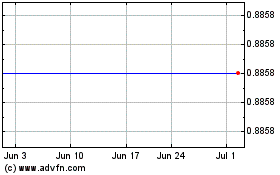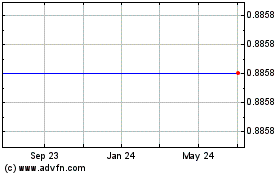By John Letzing and Aruna Viswanatha
Less than three years after Credit Suisse Group AG paid billions
and pleaded guilty to aiding tax evasion through its desk serving
American clients, the Swiss bank is a focus of a sprawling new
investigation into whether another unit kept doing the same
thing.
The latest probe could lead to an indictment of Credit Suisse,
fresh penalties or a potential curtailing of some business, among
other options, people familiar with the matter said -- and
highlights the difficulties prosecutors face in fulfilling promises
to crack down on corporate misconduct.
The U.S. Justice Department in July 2014 discovered that
American professor Dan Horsky was potentially hiding money overseas
in his Credit Suisse accounts managed by the bank's Israel desk,
according to a person familiar with the matter. That was just two
months after Credit Suisse's May 2014 guilty plea to aiding tax
evasion, and related $2.6 billion settlement.
Within a year, Mr. Horsky was cooperating in the department's
resulting investigation, surreptitiously recording his Credit
Suisse bankers and helping build yet another case against the bank,
according to court documents and people familiar with the
matter.
Investigators are determining if other clients with dual Israeli
citizenship also got help in concealing American tax obligations by
using their Israeli or other personal documents, people familiar
with the matter said.
Mr. Horsky was recently sentenced to seven months in prison and
prosecutors are weighing whether to punish Credit Suisse a second
time, according to people familiar with the matter.
The New York Department of Financial Services, which has the
ability to revoke Credit Suisse's charter in the U.S., also has
opened an investigation, one person said.
A spokesman for Credit Suisse, said: "We will continue to fully
cooperate with the U.S. Department of Justice." He declined to
comment further. A Justice Department spokeswoman declined to
comment.
The Justice Department has faced criticism since the financial
crisis for what critics describe as allowing banks to avoid the
harshest punishments for wrongdoing.
In 2014, prosecutors took a harder stance in several cases
including against Credit Suisse. In addition to having to pay
billions, the Justice Department demanded the bank plead guilty, a
rare concession by a financial institution that DOJ officials said
would prove consequential if the bank was ever caught engaging in
misconduct again.
A year later, investigators were back. Mr. Horsky received a
subpoena in April 2015, and agreed to plead guilty and cooperate
extensively with the government as a de facto detective, according
to court documents and people familiar with the matter.
Yet it wasn't until late 2015 that the Justice Department
informed Credit Suisse's general counsel, Romeo Cerutti, that
investigators had flagged an unspecified issue at the bank's desk
serving Israeli clients, according to people familiar with the
discussions. They instructed him to do nothing about it to avoid
interfering with their examination, the people said.
That put Mr. Cerutti in the awkward position of having to stand
by as a fresh probe into a painful issue from the bank's past
unfolded, people said.
Employees of the Israel desk believe Mr. Horsky surreptitiously
recorded their colleagues on several occasions during his
cooperation, on the phone and in person, a person said.
Around the time Mr. Cerutti became roughly aware of what was
going on, a senior manager at Credit Suisse's Israel desk traveled
to Israel to meet with Mr. Horsky, according to people familiar
with the matter. It isn't clear if Mr. Horsky recorded the
meeting.
The senior manager and four other Credit Suisse employees from
the Israel desk were later suspended by the bank, after it was
fully briefed by the Justice Department on its probe last year.
It isn't clear how Mr. Horsky's accounts first drew attention.
The Securities and Exchange Commission also is investigating the
new allegations, people familiar with the matter said.
Mr. Horsky, a 71-year-old, now-retired professor of marketing
science, made -- and often lost -- bets on startups in connection
with his academic research, his lawyer said in a court filing.
Even as a big bet paid off and Mr. Horsky's Swiss bank accounts
filled with more than $200 million by 2013, he was living in the
Rochester, N.Y. condominium that he bought for $77,000 in the 1980s
and was recently assessed at $55,100, according to public
documents.
In early 2000, Mr. Horsky opened an account at Credit Suisse and
deposited shares in a firm that would become QXL Ricardo, an
internet auctioneer. He stated in documents that he lived in
Israel, though he had long lived in the U.S. and never hid that
fact from bank staff, according to a court filing.
When QXL Ricardo was sold in 2008, Mr. Horsky's $500,000 stake
became worth $80 million and was poised to grow further.
In 2012, Credit Suisse employees started trying to obscure Mr.
Horsky's control of his hidden accounts by removing his name from
paperwork, according to a court filing.
Write to John Letzing at john.letzing@wsj.com and Aruna
Viswanatha at Aruna.Viswanatha@wsj.com
(END) Dow Jones Newswires
February 22, 2017 19:02 ET (00:02 GMT)
Copyright (c) 2017 Dow Jones & Company, Inc.
Credit Suisse (NYSE:CS)
Historical Stock Chart
From Mar 2024 to Apr 2024

Credit Suisse (NYSE:CS)
Historical Stock Chart
From Apr 2023 to Apr 2024
